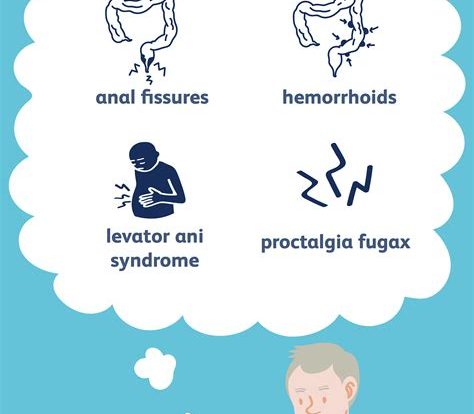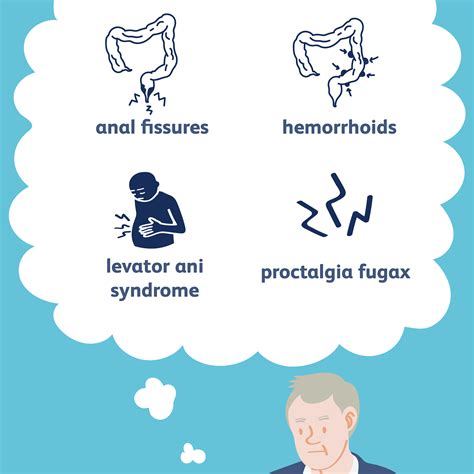

Anal pain can be caused by a variety of factors, including hemorrhoids, anal fissures, and infections. Learn about the causes and treatments here.
Anal pain is a sensitive topic that many people find uncomfortable to talk about. However, it is a common problem that affects a large number of individuals. Whether it’s a sharp, stabbing pain or a dull ache, anal pain can be debilitating and disruptive to one’s daily life. Moreover, it can be indicative of a serious underlying condition that requires prompt medical attention. That being said, it’s essential to understand the causes, symptoms, and treatment options for anal pain to ensure a healthy and comfortable life. So, let’s delve deeper into this discomforting topic.
Daftar Isi
The Unspoken Reality of Anal Pain
Anal Pain: A Common but Overlooked Condition
Anal pain is a common yet underreported health issue that affects millions of people worldwide. It is often associated with embarrassment and shame, which makes it difficult for individuals to seek help and treatment. Anal pain can be caused by a variety of factors, including anal fissures, hemorrhoids, inflammatory bowel disease, infections, and trauma.
Types and Causes of Anal Pain
Anal pain can be broadly classified into two categories: acute and chronic. Acute anal pain is sudden and intense, while chronic anal pain is persistent and ongoing. The causes of anal pain can vary depending on the type and severity of the condition. Acute anal pain can be caused by anal fissures, abscesses, and infections, while chronic anal pain can be caused by conditions such as hemorrhoids, anal fistulas, and inflammatory bowel disease.
Symptoms of Anal Pain
The symptoms of anal pain can range from mild discomfort to severe pain and bleeding. Some of the common symptoms of anal pain include itching, burning, swelling, and bleeding. In severe cases, anal pain may also cause difficulty in bowel movements and lead to fecal incontinence.
Treatment Options for Anal Pain
The treatment options for anal pain depend on the underlying cause of the condition. For acute anal pain caused by anal fissures or abscesses, over-the-counter pain medications and topical creams may be effective in relieving pain and promoting healing. Chronic anal pain caused by conditions such as hemorrhoids or inflammatory bowel disease may require more aggressive treatment options, including surgery, medication, or lifestyle changes.
Prevention of Anal Pain
Prevention is always better than cure when it comes to anal pain. Some of the ways to prevent anal pain include maintaining good hygiene, avoiding constipation, practicing safe sex, and staying hydrated. Regular exercise and a healthy diet can also help in preventing anal pain and promoting overall digestive health.
When to Seek Medical Help
It is important to seek medical help if you experience persistent or severe anal pain. Delaying treatment can lead to complications and further damage to your health. If you have symptoms such as bleeding, fever, or difficulty in bowel movements, it is advisable to consult a healthcare professional immediately.
The Stigma Surrounding Anal Pain
Despite being a common condition, anal pain is often stigmatized and considered taboo in many cultures. This stigma can prevent individuals from seeking timely medical help and lead to unnecessary suffering and complications. It is essential to break the taboo surrounding anal pain and encourage open communication about the condition.
The Importance of Mental Health
Anal pain can take a toll on an individual’s mental health and well-being. It can cause anxiety, depression, and social isolation, which can further exacerbate the condition. It is important to prioritize mental health and seek support from loved ones and mental health professionals when dealing with anal pain.
Conclusion
Anal pain is a prevalent health issue that affects millions of people worldwide. It is often associated with shame and stigma, which makes it difficult for individuals to seek help and treatment. However, with timely medical intervention and lifestyle changes, anal pain can be effectively managed, and its impact on an individual’s physical and mental health can be minimized.Understanding Anal Pain: Causes and SymptomsAnal pain is a discomfort that occurs in or around the anus, which is the opening at the end of the digestive tract. This type of pain can be caused by a variety of conditions or diseases, ranging from minor issues to serious illnesses. In order to properly address anal pain, it is important to understand the underlying causes and symptoms.Hemorrhoids: The Most Common Cause of Anal DiscomfortHemorrhoids are the most common cause of anal discomfort, affecting millions of people each year. These swollen veins in the rectum or anus can cause itching, burning, and pain during bowel movements. Hemorrhoids can be caused by straining during bowel movements, sitting for long periods of time, or pregnancy. They can be treated with over-the-counter creams and ointments, as well as lifestyle changes such as increasing fiber intake and drinking more water.Anal Fissures: When Tears in the Skin Can Be PainfulAnal fissures are small tears in the skin around the anus, which can be very painful and uncomfortable. They can be caused by constipation, diarrhea, or trauma to the area. Symptoms include sharp pain during bowel movements, bleeding, and itching. Treatment options include topical creams, warm baths, and surgery in severe cases.Infections and Sexually Transmitted Diseases That Can Cause Anal PainInfections such as proctitis, sexually transmitted diseases like chlamydia, gonorrhea, and herpes, and other bacterial or viral infections can cause anal pain. Symptoms may include itching, discharge, and painful bowel movements. Treatment typically involves antibiotics or antiviral medications, depending on the specific infection.Proctitis and Other Inflammatory Bowel DiseasesProctitis is an inflammation of the rectum, which can cause anal pain and discomfort. Inflammatory bowel diseases such as Crohn’s disease and ulcerative colitis can also cause inflammation and pain in the anus and rectum. Symptoms may include diarrhea, bleeding, and cramping. Treatment often involves medication to reduce inflammation and manage symptoms.Prolapsed Hemorrhoids: A Potentially Serious ConditionProlapsed hemorrhoids occur when internal hemorrhoids protrude outside the anus. This can be very painful and can lead to bleeding and infection. In severe cases, surgery may be required to remove the hemorrhoids.Anal Abscesses: A Common Complication of Anal GlandsAnal abscesses are painful and can cause fever and swelling in the area. They occur when bacteria infect the anal glands, which can lead to the formation of an abscess. Treatment typically involves antibiotics and draining the abscess.Chronic Constipation: When Infrequent Bowel Movements Can Lead to Anal PainChronic constipation can cause anal pain and discomfort due to the strain it puts on the anus during bowel movements. This can lead to hemorrhoids, anal fissures, and other complications. Treatment typically involves lifestyle changes such as increasing fiber intake and drinking more water, as well as taking over-the-counter laxatives.Anal Cancer: A Rare but Serious Cause of Anal DiscomfortAnal cancer is a rare but serious cause of anal discomfort. Symptoms may include bleeding, itching, and pain in the anus or rectum. Treatment typically involves surgery, radiation therapy, and chemotherapy.Treating Anal Pain: From Home Remedies to Medical ProceduresTreatment for anal pain depends on the underlying cause. Home remedies such as warm baths, topical creams, and lifestyle changes can help alleviate mild discomfort. In more severe cases, medical procedures may be necessary, such as surgery for prolapsed hemorrhoids or anal fissures. It is important to talk to your healthcare provider about any anal pain or discomfort you may be experiencing. They can help determine the underlying cause and recommend appropriate treatment options.In recent years, there has been an increasing trend towards the exploration of anal sex. However, with this comes the potential for experiencing anal pain. As a journalist, it is important to present both the pros and cons when it comes to anal pain.Pros:1. Can enhance sexual pleasure: For some individuals, anal sex can bring about intense sensations that are not experienced during vaginal intercourse. This can lead to a heightened sense of sexual pleasure and satisfaction.2. Can increase intimacy: Engaging in anal sex requires a high level of trust and communication between partners, which can lead to increased intimacy and connection.3. Can promote exploration: Trying new things in the bedroom can be exciting and lead to a deeper understanding of one’s own sexual preferences and desires.Cons:1. Can be painful: Anal pain can be a common occurrence during or after anal sex. This can range from mild discomfort to severe pain, which can negatively impact sexual pleasure and overall well-being.2. Can increase risk of infection: The anus is home to a wide variety of bacteria, which can increase the risk of infection if proper hygiene practices are not followed.3. Can cause damage to the rectum: Repeated or aggressive anal sex can cause damage to the rectum, which can lead to long-term health complications.It is important to always prioritize personal comfort and safety when it comes to sexual exploration. Communication with partners, proper hygiene practices, and taking breaks or stopping altogether if pain occurs are all important steps to take. As with any sexual activity, it is important to weigh the potential pros and cons before engaging.
As a journalist, it is my responsibility to provide accurate and informative content to my readers. In this article, I will be discussing a topic that may be uncomfortable for some but is important nonetheless: anal pain.
If you are experiencing anal pain, it is important to understand that there are several possible causes. One common cause is hemorrhoids, which are swollen veins in the rectum or anus. Other causes may include anal fissures, abscesses, or infections. It is crucial to seek medical attention if your anal pain is severe or persistent, as it may be a sign of a more serious condition such as colorectal cancer.
Preventative measures can also be taken to avoid anal pain. These include maintaining a healthy diet with plenty of fiber, staying hydrated, and avoiding prolonged periods of sitting or straining during bowel movements. Additionally, practicing safe sex by using condoms and lubrication can reduce the risk of sexually transmitted infections that may cause anal pain.
Overall, it is important to prioritize your health and seek medical attention if you experience any discomfort or abnormal symptoms. Remember to take preventative measures to avoid anal pain and promote overall wellness. Your health is important – don’t hesitate to seek help when needed.
Video anal pain
As a journalist, I have come across many curious questions from people. One of the most common queries is about anal pain. Here are some of the frequently asked questions and their answers:
1. What causes anal pain?
There can be several reasons for anal pain, including:
- Hemorrhoids: swollen veins in the anus or rectum
- Fissures: small tears in the lining of the anus
- Prolapse: when the rectum protrudes through the anus
- Infections: such as an abscess or sexually transmitted infection
- Cancer: rare, but it can occur in the anus or rectum
2. How can I relieve anal pain?
The treatment for anal pain will depend on the underlying cause. However, here are some general tips that may help:
- Take warm baths or use a sitz bath
- Use over-the-counter creams or ointments
- Avoid constipation by eating a high-fiber diet
- Drink plenty of water
- Avoid straining during bowel movements
3. When should I see a doctor for anal pain?
If your anal pain persists for more than a few days, or if you experience any of the following symptoms, you should see a doctor:
- Bleeding from the anus
- Painful bowel movements
- Fever or chills
- Unexplained weight loss
- Changes in bowel habits
Remember, anal pain can be a symptom of a serious condition, so it’s important to seek medical attention if you’re concerned.






